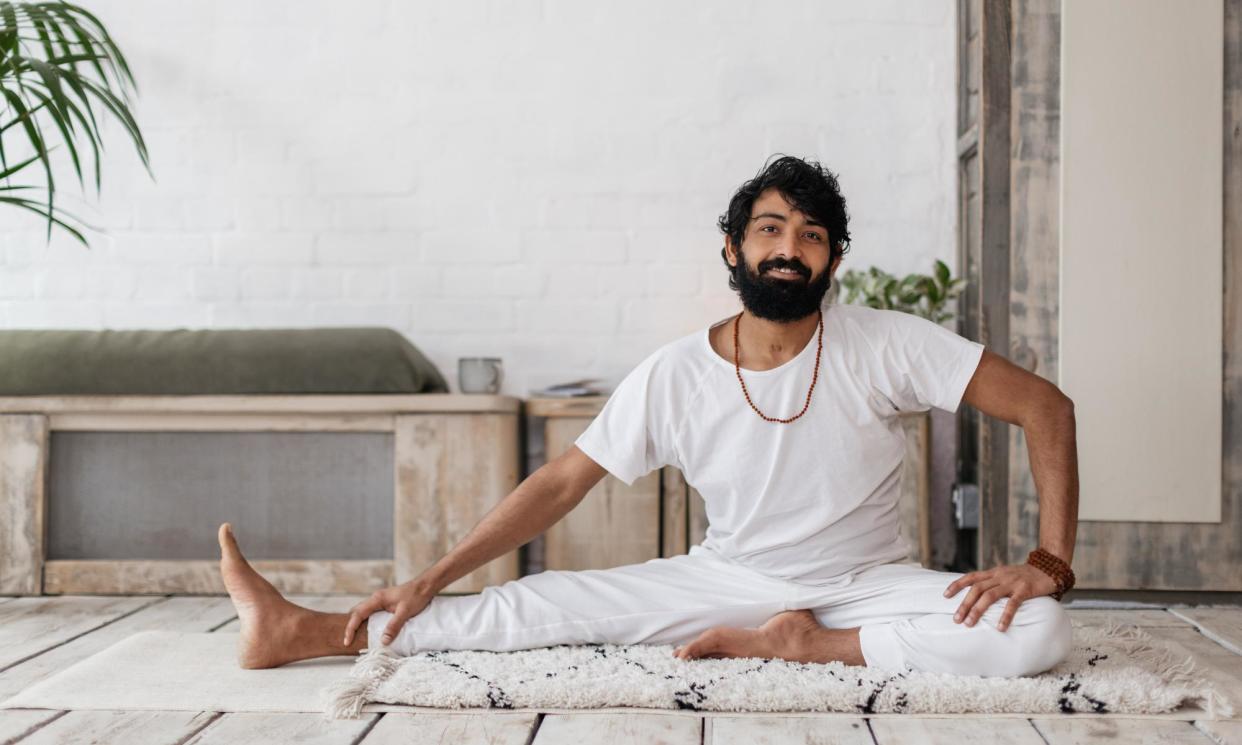Connecting with my south-Asian roots on a traditional Indian yoga retreat in the UK

Often when I’ve turned up at various yoga studios in London, the groups I’ve encountered have been overwhelmingly white, svelte and middle class. Perhaps I’ve not found the right class, but as a south Asian woman, it always felt like I was in somebody else’s space.
Yoga originated in ancient India, and I wanted to connect with my Indian roots, so I started looking for an authentic Indian yoga teacher in the UK. I thought it would be a lot easier than it was. In a 2020 report about UK yoga, 91% of practitioners who responded to the survey were white, and south Asian instructors regularly speak out about the lack of diversity in the industry.
After some internet sleuthing, I came across 36-year-old Ravi Dixit, an Indian yogi born in the village of Ramaipur, in Uttar Pradesh, who now lives in London and runs retreats in the UK. Dixit comes from a long line of spiritual teachers known as Brahmins, and was raised with yoga practice ever since he was a small child. “I lived the Vedic life,” he says, referring to the religion that arrived in India from what is now Iran over 3,000 years ago. “To me, authentic yoga is based on the values and principles of how it is traditionally practised in India. It is a roadmap to a way of life, not just a physical practice.”
And that’s how I find myself on a retreat in Lincolnshire, alongside 20 other people, waving our limbs about with wild abandon. Still slightly giddy from the 10 minutes of quick, deep nasal breathing that came before, I open my eyes and see people in front of me laughing, crying or dancing ecstatically. Usually this is the moment when I think: “We must look crazy.” But having spent some time with Dixit, “the smiling yogi”, I’m not at all self-conscious. So I close my eyes and continue the unrestrained movement until suddenly the music stops and Dixit begins throwing his arms down with a loud and powerful “hoo” sound.
“Whatever you feel, just let it come out,” he says. “In the outside world, we have to be so polite and keep things in. Here you must let out whatever comes to you.”
No shoes are allowed inside The Vedanta, a grand yet cosy Grade II-listed Elizabethan manor house near Branston, so it quickly feels like home as I lie on the sofa by the fire and run up the wide wooden staircase in my socks. My room has high ceilings and huge windows overlooking the estate’s lake and surrounding woodland. Between classes, many of us take the opportunity to explore the beautiful grounds, as well as the on-site spa withwhirlpool bath. Meals are in line with Ahimsa, the principle of not causing harm to other living things, and so we enjoy three meals a day of healthy and delicious vegetarian and vegan food, with a constant selection of fresh fruit and herbal tea.
The retreat caters for all capabilities, ages and ethnicities – not my experience of many mainstream yoga classes
However, there are moments during the weekend’s eight hours of hatha yoga when I think my body has reached its limits. From Friday evening to Sunday afternoon, Dixit leads us through four yoga sessions, each one around two hours long. I am a beginner, and while it’s a lot of yoga in a short amount of time, Dixit builds the sessions up from small, repetitive movements to stretches, to more energetic flows and holds, before ending with the word that feels like a well-earned gift: “savasana”. This is the corpse posture, where we lie on our backs and Dixit tells us to “surrender” our bodies completely for 10 minutes. “The surrender is such an important part of the practice,” he says, explaining how accepting and observing stillness is vital mindfulness.
The retreat caters for all capabilities, ages, ethnicities, body types and backgrounds – not my experience of many mainstream yoga classes in London. There are several other south Asian women there, as well as three men. During our final class, Dixit explains that in India it is traditionally men who practise yoga, rather than the female-dominated classes in the west.
Part of what makes the sessions feel so authentic are the Sanskrit mantras Dixit chants. It feels like a ritual that’s been unchanged for thousands of years. As incense fills my nose, and I listen to his throat vibrating as he thanks different deities, I am transported out of Lincolnshire to India. “Knowing all of the history and why you’re doing different postures makes it so much more fulfilling,” says fellow attendee Narlep Kaur.
Classes in the west often focus more on the physical ‘asana’ side of yoga rather than the wider, holistic practice, adds Dixit. “Many western forms of yoga only work on the physical side of the body, to reduce weight, get a fitter body, sweating out while we’re being quite hard on ourselves, and that’s not what yoga is. Yoga teaches us to not be hard on ourself, but to be kind to ourself.”
A key message from Dixit is that yoga should be for everyone. “Although the practice has roots in Asia, yoga does not belong to me or you; it’s for everyone. You don’t need fancy clothes, an expensive mat, a long class or to meditate for hours. Yoga is about connecting with yourself in any place at any time.”
I left feeling connected with my body, mind, and culture in a way I haven’t before. I didn’t look in a mirror all weekend but feel like I saw myself better than I ever have.
A three-day retreat at The Vedanta cost £550 for a single-occupancy room, or £450pp in a shared room. Ravi Dixit runs regular online and in-person yoga classes in Richmond, London, and is opening a new boutique yoga resort in Goa in November 2024


